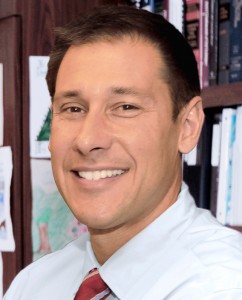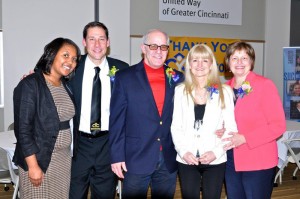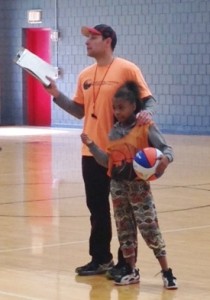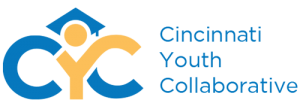 Author Kent Wellington is a father of two and a 20-year CYC mentor to various vulnerable kids full of spit, vinegar, and potential. He also has served on the CYC board for many years, acting as Board Chair for the past 11 years, and he co-chairs CYC’s Saturday Hoops mentoring program in OTR, now in its 12th year. In his day job, Kent is an attorney at Graydon Head where he chairs the firm’s Litigation Group, helps lead community efforts and some other innovative stuff, and has a pretty good time of it on most days. In this month’s Youth Matters, he explains why mentors are the most important ingredient to building a stronger community.
Author Kent Wellington is a father of two and a 20-year CYC mentor to various vulnerable kids full of spit, vinegar, and potential. He also has served on the CYC board for many years, acting as Board Chair for the past 11 years, and he co-chairs CYC’s Saturday Hoops mentoring program in OTR, now in its 12th year. In his day job, Kent is an attorney at Graydon Head where he chairs the firm’s Litigation Group, helps lead community efforts and some other innovative stuff, and has a pretty good time of it on most days. In this month’s Youth Matters, he explains why mentors are the most important ingredient to building a stronger community.
WE WANT YOU!
There is no shortage of community programs and charitable organizations designed to fix our community’s poverty problems. But in my opinion, only two types work.
First, if an anti-poverty program is going to move the needle it must be collaborative. And by definition, that program needs to be made up of leaders and doers who regularly communicate with other program leaders and doers, and who listen. Too often, new programs pop up that are spot-on, but repetitive of existing programs. They mean well but end up overlapping and creating inefficiency. They make more noise and confusion in an already noisy and confusing space.
Mentoring is a perfect example. When we really drill down to the root of many of our community’s problems, we find vulnerable kids who are under-parented by parents who were under-parented by parents who were under-parented, and so on and so on. The cycle continually repeats itself until someone intervenes. Mentors intervene. Mentors break the cycle. However, our city does not need new mentoring organizations. We need more collaboration and communication from current organizations and by the leaders and doers involved in mentoring. We need less noise and more simplicity.
Second, we need programs made up of individual leaders and doers who are willing to engage in sustained personal relationships with our vulnerable kids. When my kids were young, I told them a version of the story of the tortoise and the hare that I heard somewhere before. Instead of a foot race, the blue ribbon would be awarded to the one who made the most friends by the end of the day and met them at the finish line. The hare took-off and asked 100’s of people to be his friend. He even secured about 50 “Facebook friends.” He asked each of them to meet him at the finish line as he quickly raced to the next “friend request.” He even followed-up with blast email reminders. The tortoise moved more deliberately and met a squirrel. One squirrel. And he spent the entire day with her. They walked together. Talked. Played. Checked out the squirrel’s home and where she hid her acorns. And, after a while, the tortoise even met the squirrel’s parents and siblings. Eventually the tortoise and the squirrel walked across the finish line together as the sun set. The hare finished hours before and waited for his legion of “friends” to arrive. No one did. The tortoise won the race and, more importantly, made a new lifelong friend in the squirrel. The squirrel was a winner, too.
CYC mentors are tortoises in a world of hares. CYC mentors are slow-moving, real friends in a world of tangent “Facebook friends.” In the long run, tortoises move the needle the farthest. Personally, I believe God made us to be tortoises, and I believe that is how we are designed to fix things.

If you don’t like altered nursery rhymes or find the prior tale too soft, how about a battlefield metaphor like this: If we choose to fight the growing war on poverty as only an air war, we will lose. We need foot soldiers. Good mentors are good foot soldiers. They roll up their sleeves on a sustained basis and get into our schools, apartment buildings, and neighborhoods. They get into our mentees’ lives. CYC mentors see firsthand where the hurdles are for their mentees and help the mentees move them. Sometimes they are little-bitty hurdles that seem like brick walls to their mentees until they are quickly removed. Other times, they are bigger hurdles that require more creativity and stamina. Either way, there is no substitute for sustained personal mentoring relationships.

As Margaret Mead astutely put it, “Never doubt that a small group of thoughtful, committed citizens can change the world. Indeed, it is the only thing that ever has.” Yep.
We need more committed mentors. We more pointed, weekly discussions in our mentees’ family rooms. We need more one-on-one’s. We need more collaborators. We need more tortoises and fewer hares.
We need YOU as a CYC mentor for one vulnerable kid in 2016.
Ready to be a tortoise? Sign up today!
Never miss a new CYC story! Subscribe below to receive an email notification when a new post is added to the CYC Blog.
[subscribe2]
Have a story to share? Contact Kate Elliott to discuss contributing to the CYC blog: [email protected] | 513.363.5251


